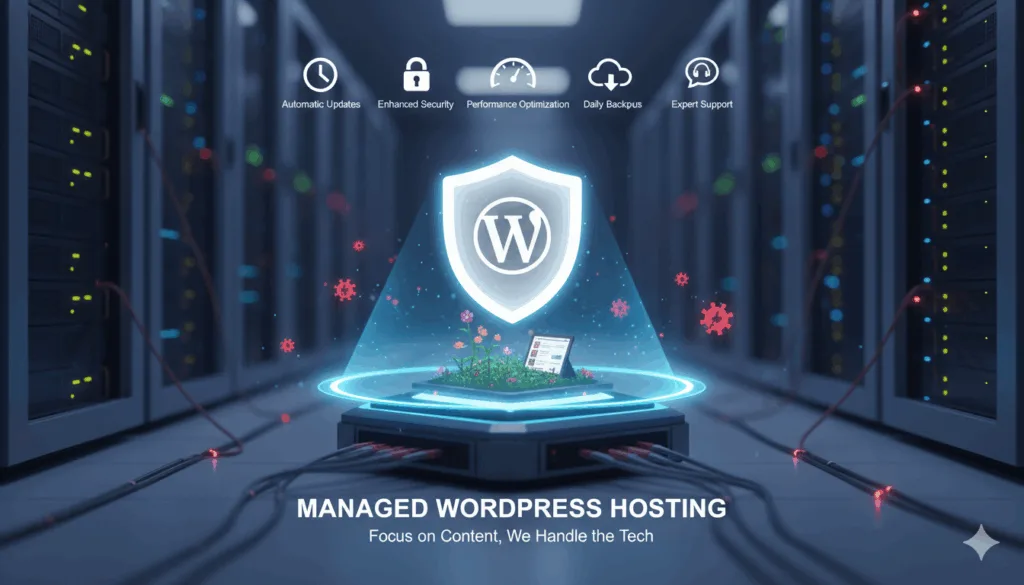What started as a simple content management system has evolved into the backbone of the modern internet. WordPress now powers over 43% of all websites globally, transforming from a basic blogging platform into a complete digital solution. Behind this success lies a hosting revolution that’s changing how businesses approach their online presence.
In 2025, the managed WordPress hosting market is experiencing unprecedented growth, with providers reporting a staggering 13.4% compound annual growth rate. The numbers tell a compelling story: from $31.77 billion in 2024, the market is projected to reach $98.52 billion by 2033.
This review will explore whether managed WordPress hosting lives up to its growing reputation and help you determine if this premium service deserves your investment. We’ll examine real-world performance, analyze costs versus benefits, and uncover the truth behind the marketing promises.
What Is Managed WordPress Hosting?
Managed WordPress hosting represents a specialized approach to web hosting designed exclusively for WordPress websites. Unlike traditional shared hosting where you manage everything yourself, managed hosting providers handle the technical complexities behind your website.
The service includes automatic WordPress updates, daily backups, security monitoring, performance optimization, and expert support from WordPress specialists. Your hosting provider essentially becomes your website’s technical team, managing everything from server configurations to security patches.
Think of it as hiring a team of WordPress experts to maintain your website 24/7 while you focus on creating content and growing your business. The managed aspect means less technical headaches and more time for strategic work.

Why Managed WordPress Hosting Matters in 2025
The digital landscape has become increasingly competitive, with website performance directly impacting business success. Studies show that even a one-second delay in page loading can cause significant drops in conversions and search engine rankings.
WordPress’s popularity makes it a prime target for security threats, requiring constant vigilance and updates. Traditional hosting leaves these responsibilities entirely to website owners, creating potential vulnerabilities and maintenance burdens.
Businesses are recognizing that website infrastructure is no longer just a technical concern but a strategic business asset. Managed WordPress hosting addresses this shift by providing enterprise-level capabilities to businesses of all sizes.
Managed WordPress Hosting at a Glance
The managed hosting ecosystem encompasses several key service categories. Entry-level plans typically start around $15-30 per month, offering single-site hosting with basic managed features. Mid-tier plans range from $50-100 monthly, supporting multiple websites with enhanced performance features.
Enterprise solutions can cost hundreds or thousands monthly, providing dedicated resources, advanced security, and custom configurations. Most providers operate on a visit-based pricing model rather than traditional resource limits.
Leading providers include established names like WP Engine, Kinsta, and SiteGround, alongside newer entrants like Rocket.net and Pressable. Each offers varying feature sets, performance levels, and support quality.
Core Offerings That Stand Out
Managed WordPress hosting distinguishes itself through WordPress-specific optimizations that generic hosting cannot match. Server configurations are fine-tuned for WordPress performance, including optimized PHP versions, MySQL databases, and caching systems.
Automatic updates represent a significant advantage, ensuring WordPress core, themes, and plugins remain current without manual intervention. This reduces security vulnerabilities while maintaining compatibility across your website’s components.
Advanced caching technologies like Redis and Memcached accelerate website loading times dramatically. Content delivery networks distribute your content globally, reducing load times regardless of visitor location.
Staging environments allow safe testing of changes before implementing them on live websites. This feature proves invaluable for developers and businesses making frequent updates.
Technology & Performance
Performance represents managed hosting’s most compelling advantage. Providers utilize enterprise-grade infrastructure including SSD storage, optimized server configurations, and advanced caching mechanisms.
Load times consistently outperform traditional hosting by significant margins. Many managed hosts report average load times under one second, compared to 3-4 seconds on standard shared hosting.
Uptime guarantees typically exceed 99.9%, with many providers achieving near-perfect availability. This reliability stems from redundant infrastructure, automatic failover systems, and proactive monitoring.
Resource allocation remains dedicated rather than shared, preventing the “bad neighbor” effect where other websites impact your performance. This isolation ensures consistent speed regardless of traffic fluctuations on other sites.
Ease of Use & Accessibility
Managed hosting simplifies WordPress management through custom control panels designed specifically for WordPress users. These interfaces streamline common tasks like staging site creation, backup management, and performance monitoring.
One-click WordPress installation and automatic SSL certificate provisioning eliminate technical barriers for beginners. Many providers include website builders and professional themes to accelerate site creation.
Developer tools like SSH access, Git integration, and WP-CLI support accommodate advanced users without compromising simplicity for beginners. This dual approach makes managed hosting suitable for various skill levels.
Migration assistance helps transfer existing websites seamlessly, with many providers offering free migration services handled by technical experts.
How Much Does Managed WordPress Hosting Cost?
Pricing varies significantly based on features, performance, and provider reputation. Entry-level managed hosting typically costs $15-30 monthly for single-site hosting with basic managed features.
Popular providers like Kinsta start at $30 monthly for their entry plan, supporting one website with 10GB storage and 25,000 monthly visits. WP Engine’s basic plan costs $25 monthly with similar specifications.
Mid-range plans supporting multiple websites cost $50-100 monthly. These typically include enhanced performance features, increased storage, and higher visit limits.
Enterprise solutions can cost $200-500+ monthly, offering dedicated resources, advanced security, and custom configurations. Some providers charge additional fees for traffic overages, potentially increasing costs significantly.
Is It Worth the Price?
The value proposition depends heavily on your specific needs and technical capabilities. For businesses lacking technical expertise, managed hosting provides essential services that would otherwise require hiring specialists.
Time savings alone can justify the cost for many users. Instead of managing updates, security, backups, and performance optimization, you can focus on content creation and business growth.
Security benefits prove particularly valuable given WordPress’s popularity among hackers. Professional security monitoring and automatic updates reduce breach risks that could cost thousands in recovery expenses.
Performance improvements translate directly to business benefits through better user experience, higher search rankings, and increased conversion rates. Studies show faster websites generate more revenue per visitor.
Strengths of Managed WordPress Hosting
Expert support represents managed hosting’s greatest strength. Unlike generic hosting support, managed WordPress providers employ specialists who understand WordPress-specific issues and solutions.
Performance optimization occurs at the server level, achieving speeds impossible with traditional hosting and plugins alone. Professional-grade caching, CDNs, and server configurations deliver enterprise-level performance.
Security measures exceed what most website owners can implement independently. Continuous monitoring, malware scanning, and automatic security updates provide comprehensive protection.
Scalability handles traffic spikes automatically without manual intervention. Whether experiencing viral content or successful marketing campaigns, managed hosting adapts resources dynamically.
Developer-friendly features like staging environments, version control integration, and command-line access satisfy technical users while remaining accessible to beginners.
Limitations to Keep in Mind
Cost represents the primary drawback, with managed hosting costing 3-10 times more than basic shared hosting. For budget-conscious users, this premium may seem excessive.
Plugin restrictions can frustrate users accustomed to complete WordPress freedom. Many providers ban certain plugins that conflict with their optimization systems or pose security risks.
Storage limitations often surprise users transitioning from “unlimited” shared hosting. Managed plans typically provide specific storage allocations, with additional space costing extra.
Traffic-based billing can create unexpected costs during successful periods. Unlike fixed-resource hosting, managed providers often charge overage fees for exceeding visit limits.
Vendor lock-in concerns arise due to provider-specific optimizations and configurations. Migrating between managed hosts can prove more complex than moving between traditional hosts.
Is Managed WordPress Hosting Reliable for Business Use?
Reliability statistics consistently favor managed WordPress hosting over traditional alternatives. Uptime guarantees typically exceed 99.9%, with many providers achieving 99.99% availability.
Redundant infrastructure eliminates single points of failure through geographically distributed data centers, real-time database replication, and automatic failover systems.
Proactive monitoring identifies and resolves issues before they impact users. Many problems get fixed automatically without website owners ever knowing they occurred.
Enterprise-grade security measures protect against evolving threats through continuous updates, malware scanning, and vulnerability assessments.
Customer Support & Community
Support quality represents a key differentiator among managed hosting providers. The best providers employ WordPress experts rather than generic technical support agents.
Response times for critical issues often measure in minutes rather than hours. Many providers guarantee response times for different issue severity levels.
Knowledge bases specifically address WordPress-related topics with detailed guides, tutorials, and troubleshooting resources.
Community forums connect users with similar challenges while providing additional support channels beyond official support tickets.
Some providers offer account management services for enterprise clients, providing dedicated contacts for complex issues and strategic planning.
What Else Can You Consider?
Traditional shared hosting remains viable for budget-conscious users with technical skills. Providers like Hostinger offer WordPress-optimized shared hosting starting under $3 monthly.
Cloud hosting platforms like DigitalOcean or AWS provide flexibility for technically skilled users willing to manage WordPress installations manually.
WordPress.com offers a middle-ground option with some managed features at lower costs, though with limited customization options.
Virtual Private Servers (VPS) provide dedicated resources without full management, appealing to users wanting control with better performance than shared hosting. Why VPS is popular among hosting providers demonstrates this growing trend.
How Managed WordPress Hosting Stacks Up Against Competitors
Performance comparisons consistently show managed WordPress hosting outperforming shared hosting alternatives. Load times average 50-70% faster on managed platforms.
Security incident rates remain significantly lower on managed platforms due to professional monitoring and automatic updates.
Support satisfaction scores favor managed hosting providers, with specialists providing more effective assistance than generic support teams.
Total cost of ownership often favors managed hosting when factoring in time savings, reduced security risks, and performance benefits.
Should You Choose Managed WordPress Hosting for Your Project?
The decision depends on several key factors. Businesses prioritizing performance, security, and reliability will find managed hosting delivers clear value despite higher costs.
E-commerce websites particularly benefit from managed hosting’s performance optimizations and security features. The cost of downtime or security breaches often exceeds annual hosting expenses.
Content creators and bloggers focused on growth rather than technical management find managed hosting liberating, allowing concentration on content creation and audience development.
Budget-conscious users with technical skills might prefer traditional hosting initially, upgrading to managed solutions as their websites grow.
Final Thoughts
Managed WordPress hosting represents a mature solution addressing real business needs in 2025’s competitive digital landscape. The 54% growth rate among providers reflects genuine demand for professional WordPress management services.
While costs exceed traditional hosting significantly, the value proposition proves compelling for businesses prioritizing performance, security, and reliability over pure affordability.
The technology continues evolving with AI-assisted management, enhanced security features, and improved performance optimization. Early adopters often gain competitive advantages through superior website performance and reliability.
For businesses serious about their online presence, managed WordPress hosting transforms website infrastructure from a potential liability into a strategic asset. The investment typically pays dividends through improved performance, reduced security risks, and valuable time savings.
For hosting solutions with additional benefits, consider exploring get 20% off on web hosting options that provide professional support and optimized performance.













